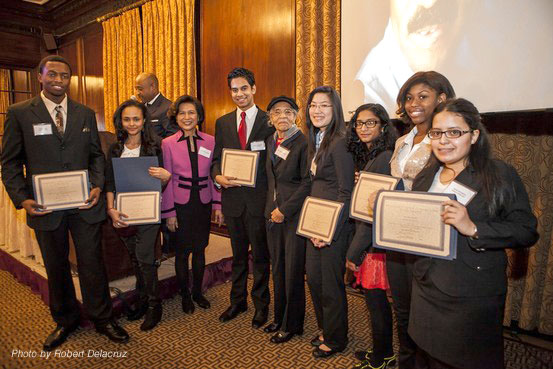Mogul's Legacy Lives On
What better way to celebrate the Martin Luther King Jr. holiday weekend than a gathering at a Midtown club commemorating businessman Reginald F. Lewis, a larger-than-life entrepreneur? By Gary Shapiro
High-school seniors who received scholarships from the Reginald F. Lewis Foundation with Loida Nicolas Lewis, in pink, and Carolyn E. Fugett. |
Lewis, the pioneering African-American who owned and ran a billion-dollar corporation, died at the age of 50 in 1993. Gap-toothed and driven for success, the future titan even sold his Baltimore paper route for a profit. He attended Harvard Law School and worked at Paul, Weiss, Rifkind, Wharton & Garrison, before founding his own firm. Panelist Charles Clarkson recalled Lewis hiring him in 1973 with the words, "I can't really pay you a lot, only $14,000." To which Mr. Clarkson replied, "You know, Reg, that's 100% more than I'm making now." On his first day at the law firm, Lewis wanted Mr. Clarkson to go to White Plains and close a deal. "You'll do fine," he recalled Lewis saying, "Just go up there and make believe you know what you're doing." When posed a question at the closing, Mr. Clarkson said he retreated to a bathroom to call Lewis for an answer. |
The audience laughed when Mr. Clarkson said he and Lewis eventually came to the conclusion that "working as a lawyer was not a way of making any money." Turning entrepreneur, Lewis bought the more-than-century-old sewing pattern company McCall's and sold it at a 90-fold profit for investors. He went on to purchase Beatrice International Foods, a behemoth of 64 companies.
And good thing: Lewis liked the finer things in life, including a corporate jet with a mural by African-American artist Ed Clark; the former Fifth Avenue duplex of car titan John DeLorean; and a 25-room Georgian-style home in Amagansett. Lewis would sometimes walk with former Beatrice vice president, Rene "Butch" Meily, with a Bentley trailing a few steps behind.
But Lewis's philanthropy was also well known and very wide-ranging. Several New York City public high-school students received scholarships of between $1,000 and 5,000 from his foundation at the event. Neal Shapiro, president and CEO of WNET, highlighted the Reginald Lewis Minority Fellowship program.
Entertainment lawyer L. Londell McMillan, whose clients have included Stevie Wonder and Spike Lee, got a directive from Lewis "to go into corporate finance, that it was the new civil-rights imperative of my generation."
Other speakers included the former CEO of TLC Beatrice International and brother of Lewis, Jean S. Fugett Jr., and CEO of Muse Recordings, Mike Muse. Lewis's mother, Carolyn E. Fugett, opened the program with a blessing and his widow, philanthropist Loida Nicolas Lewis, who at one time ran TLC Beatrice, closed the program.
A version of this article appeared January 23, 2013, on page A22 in the U.S. edition of The Wall Street Journal, with the headline: Mogul's Legacy Lives On.


